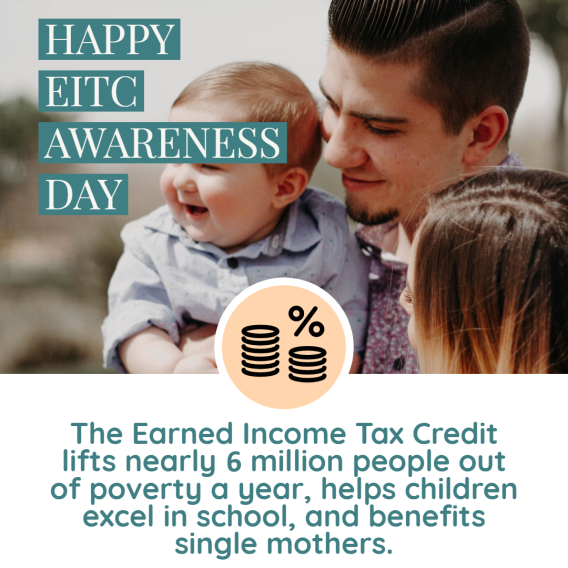
More than 610,000 people formerly incarcerated at state and federal prisons reenter communities each year. People with criminal records often have trouble finding jobs, and since they may be “starting over,” their resources are very limited. The jobs they find tend to be low-wage and/or temporary, making it difficult to achieve financial stability.
The Earned Income Tax Credit (EITC) and the Child Tax Credit (CTC) can provide support for eligible formerly incarcerated people, improving their ability to secure long-term employment and reducing the risk of recidivism. Note that income from jobs worked in prison does not count for these tax credits. In addition, some formerly incarcerated people may still be able to receive missed stimulus checks through the Recovery Rebate Credit.
Additionally, approximately 2.7 million children have a parent who is in a U.S. prison or jail. Tens of thousands of children stay with a relative or enter foster care when a parent is incarcerated. The EITC, CTC, and Recovery Rebate Credit can provide these caregivers a much-needed financial boost.
CONNECT WITH
- Reentry organizations
- Parole agencies
- Legal aid offices
- Organizations that serve relatives of people who are incarcerated
- Employers
STRATEGIES
1. Reach out to reentry-focused organizations.
Enlist state and local reentry programs, including rehabilitative programs and post-release transitional programs. These programs often provide job training and job placement help for formerly incarcerated people to secure employment upon their return to the community. Outreach campaigns can train reentry program staff about the tax credits so that they can incorporate this information into their services.
Encourage reentry advocacy groups and faith-based organizations to display tax credit flyers in highly visible areas, such as laundry mats, gas stations and convenience stores. Groups can also host an event to highlight the support systems needed for people reentering society.
2. Partner with parole agencies and corrections officials.
Work with parole agencies and corrections officials to help ensure people who are approaching release from prison are aware of the EITC, CTC, and free tax filing help upon their reentry into the community. Some parole agencies help link people on parole to job training programs.
Encourage corrections officials to include tax credit information in financial education classes. People who are newly incarcerated may be eligible to claim these tax credits based on work completed prior to entering prison.
3. Educate local public defenders and legal aid office staff.
In addition to providing legal representation, legal aid offices may appoint case managers to help clients finding community resources. Such offices can provide information about the tax credits and where to find free tax filing help.
The Legal Services Corporation (LSC) is a public nonprofit organization that provides funding for civil legal aid services across the country. Use the locator tool to find LSC-funded legal aid organizations in your community.

4. Ensure that relatives caring for children of a parent who is in prison are aware of their eligibility for the EITC and CTC.
Work with organizations that serve relatives of people who are incarcerated. Some communities run programs for children of incarcerated parents, such as emergency childcare, day care, and part-time summer camps.
The National Resource Center on Children and Families of the Incarcerated is a national organization that provides support for families of incarcerated people and has a directory of state and local programs.
5. Let employers know about the Work Opportunity Tax Credit (WOTC).
The Work Opportunity Tax Credit (WOTC) is available to employers for every qualified new worker hired from one of ten categories, including formerly incarcerated people. The credit is worth $2,400 to $9,600. New employees must be hired within one year of the date on which they were released from prison. Learn more about the WOTC.

ADDITIONAL RESOURCES
- National Reentry Resource Center
- Educational Materials for Re-Entry Programs – IRS
- Reentry Myth Buster Fact Sheets – National Reentry Resource Center
- Residential Reentry Centers – Federal Bureau of Prisons
- Words Matter: Don’t Call People Felons, Convicts, or Inmates – Vera Institute of Justice
- Legal Aid Organization Locator – Legal Services Corporation






